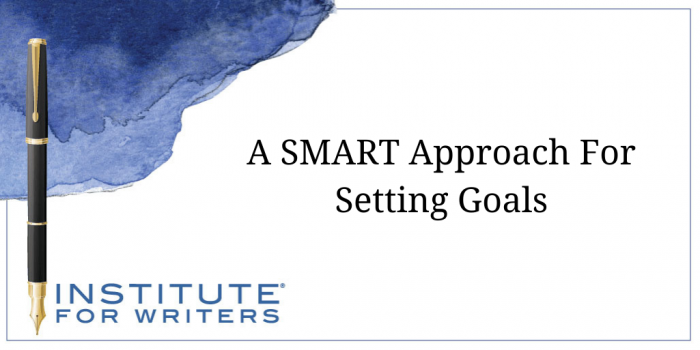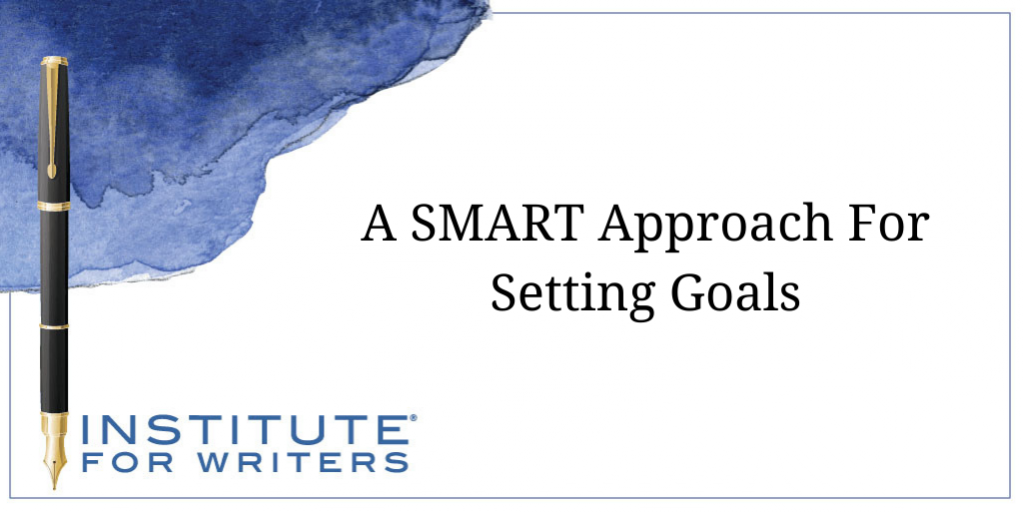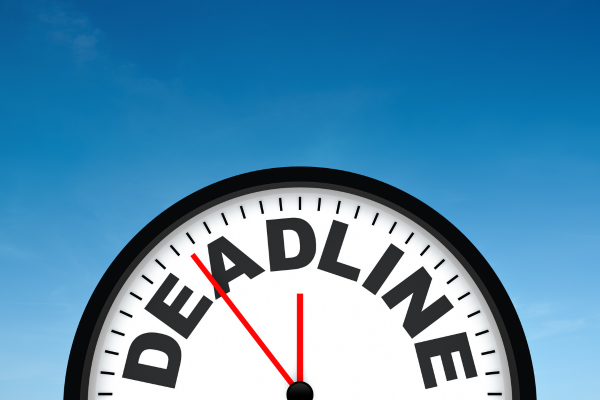
- Date: December 8, 2020
- Author: Victoria Sherrow
- Category: Writing for Adults Blog
- Tags: Goal Setting, goals, Time Management
We teach our students how to write and get published!
View our Course Catalog >
A SMART Approach For Setting Goals
A new year is coming—a fresh chance to jumpstart your writing. This series on goal setting for writers started last week when we covered Step One: Set your goals. Common categories of writing goals involve productivity, skills development, business matters (sales, marketing, promotion), and personal satisfaction. Read that post here.

• This year, I will sell a book. (or: I will sell a story/article to X-top-magazine).
• I’ll win a writing contest.
• Within five years, I’ll have a book on the best-seller list.
• Someone will buy the movie rights to my book.
• This year, I’ll attract X number of new followers to my blog.
There’s nothing wrong with wanting any of these things. But they are broad, general objectives—more like writing dreams. Our writing dreams can help to motivate us, but to make them come true, we want to set concrete, realistic goals that we can achieve step by step through our own efforts.
Get SMART Goals!
How do we set goals that can make our writing dreams come true? Many people use the SMART goal approach, which became popular in the business community during the late 1900s. The acronym S.M.A.R.T. made its first-known appearance in 1981 in an article by corporate consultant George T. Doran in Management Review, but it reflects the writings of self-help author Napoleon Hill in the late 1930s. The SMART goal approach offers a checklist of five criteria for creating goals:
Specific. Measurable. Achievable. Relevant (sometimes listed as Realistic). Time-bound.
Specific
What do you want to accomplish? What steps will you take to get there? Suppose you want to finish a book this year. Of course, you must know what type of book you will write and the approximate length. List the actions you need to take on a daily, weekly, and monthly basis to achieve that goal.

For a historical novel, you might set specific goals for choosing your research materials and make plans to read them and take notes. For a novel, you might decide to sharpen your skills in writing dialogue or world-building. You can make plans to read more about those writing elements, attend a conference that focuses on skills you want to improve, enroll in a course or workshop, and/or join a critique group. One writer decided to improve her skills by studying novels by winners of the Nobel Prize in Literature. She made a list of 24 books that were most relevant to her own writing and set a schedule for reading two each month.
Measurable
Quantify each goal so you will know when you have reached it. If you plan to write a certain number of hours each day, you can easily determine whether or not you are meeting that goal. Better yet, decide what times each day or week you will write (more specific!) You can also determine if you have met your goals of completing a certain number of words, paragraphs, or pages each day or week. You might aim to finish one chapter per month.
Likewise, if you sign up for a course or workshop, you can reach a goal of attending each session and completing the lessons. One author set a goal of spending two hours each Friday morning writing and sending out queries. That’s easy to measure. Another writer set a tongue-in-cheek goal of acquiring X-number of rejections for the coming year. Of course, he submitted his best work in every case and was happy when acceptances also came his way, making it harder to reach his “goal.” But setting that goal kept him writing and submitting at a steady rate all year.
Achievable
Do you have control over your goal, or does it depend on other people’s efforts, approval, or help? You want to be able to reach goals through your own efforts and with resources that can access.

On the other hand, you might be able to write each day on a train or bus while commuting to and from work. You might be able to read your writers’ magazine or newsletter while waiting in a doctor or dentist’s waiting room. If your local library lacks reference materials you need, you can resolve to learn more about the library’s online reference resources and check the websites of relevant historical societies and/or government websites.
Bottom line: Is this a goal you can realistically hope to accomplish? If not, make adjustments.
Relevant
Does this goal fit well with your long-term aims? Does it serve a clear purpose? Does it fit with your personal interests, skills, qualifications, and/or passions?
If your goal is to find markets for sports stories, wandering onto the websites of gardening magazines might be interesting but not relevant to your goal. If you want to sell your writing to a specific market, these goals would be relevant:
- Study issues of that magazine or the book publisher’s catalogue.
- Read their submission guidelines carefully.
- Check out blogs or interviews by the editor(s) that relate to the publisher’s needs and interests.
(And, of course, make these measurable by deciding when you will take these steps.) That brings us to the final “piece” in the SMART goal approach….
 Time-bound
Time-bound
Best-selling author Napoleon Hill once wrote, “A goal is a dream with a deadline.” Setting deadlines keeps us on track, as well as providing another measuring stick for our progress. When we have an unlimited amount of time to do something, there’s no feeling of urgency.
Working writers with contracts have editorial deadlines to meet, but even without a contract, you can set deadlines for yourself. Put your due dates and personal deadlines in writing, and hold yourself accountable. Many writers find it helpful to join other writers in November to reach the goal of 50,000 words for NaNoWriMo (National Novel Writing Month). People who don’t write novels can write 50,000 words of short stories, articles, memoir, or nonfiction books during that 30-day time period.
Setting a SMART goal might be just the approach you need to achieve your writing dreams. The remaining blogs for this month will discuss more ways to set meaningful goals and stay on track.
Related Links
Victoria Sherrow has published short stories, articles and books (fiction and nonfiction) for readers aged preschool through adult. Her books have received starred reviews and been honored by the American Library Association, Parents Choice Gold Award, National Association for the Advancement of Science, and NYPL Best Books for the Teenage, among others. Victoria has taught at The Institute of Children’s Literature for more than 25 years and has also been an assistant editor and writing contest judge. Recently, she revised—and cut—a 230,000-word book for adults.
Become a better writer today
1000 N. West Street #1200, Wilmington, DE 19801
© 2024 Direct Learning Systems, Inc. All rights reserved.
1000 N. West Street #1200, Wilmington, DE 19801
© 2024 Direct Learning Systems, Inc. All rights reserved.
1000 N. West Street #1200, Wilmington, DE 19801
© 2024 Direct Learning Systems, Inc. All rights reserved.


 Time-bound
Time-bound











10 Comments